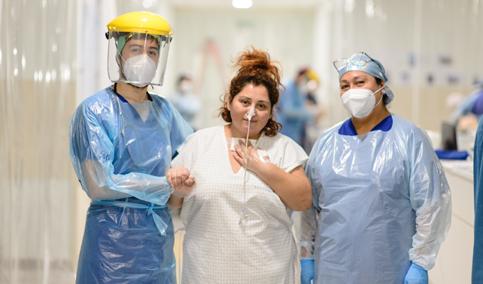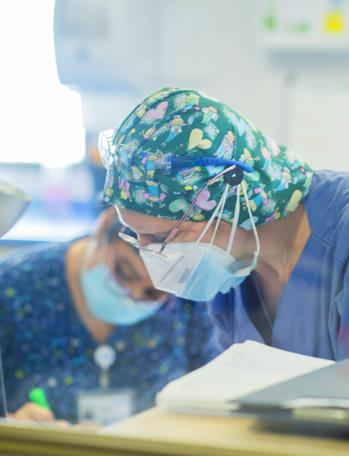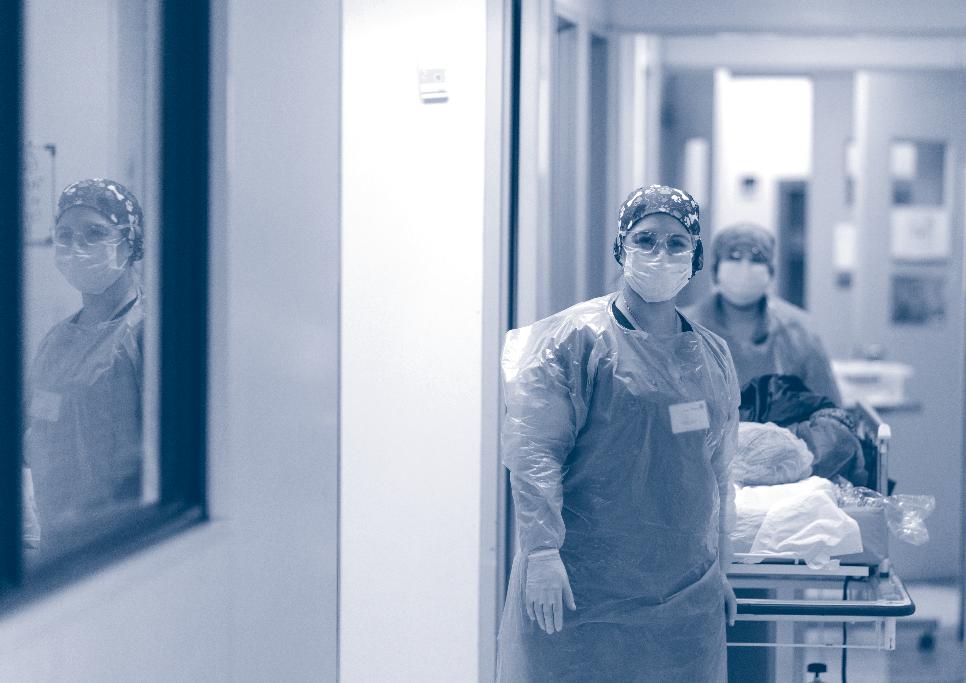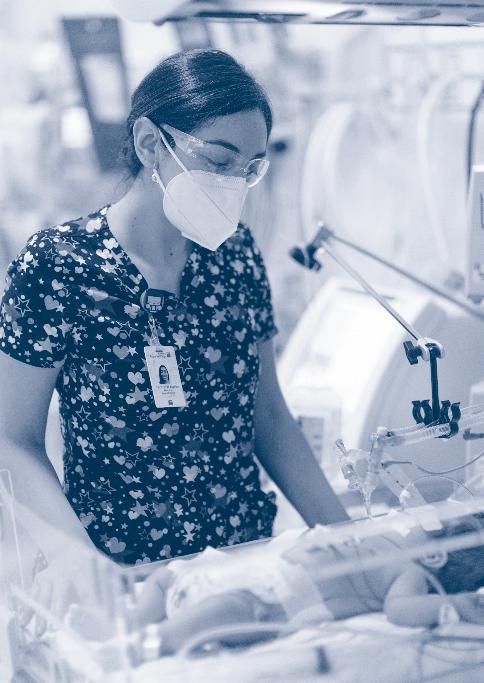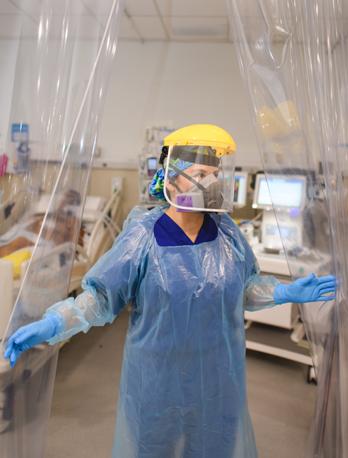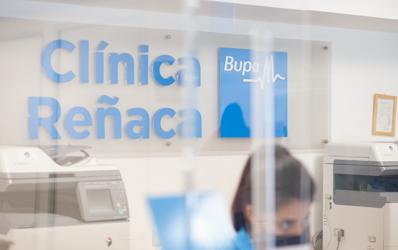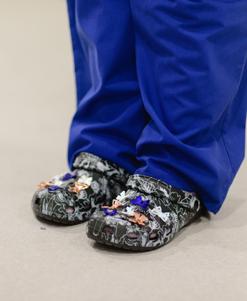
8 minute read
We just hoped for a miracle
I got Covid
rosa larios Nurse Hospital Virgen del Mar
I have managed to get the fatigue under control. I do my breathing exercises and all that, but I still have muscle aches, particularly in my legs.
When we started the year we saw on tv about the virus in China, but never imagined it would affect us so profoundly. It crept up on us suddenly. First there were two or three patients, then it suddenly grew. All the beds filled up and people came in very unwell, with fever and problems with oxygen saturation levels. We didn’t know what to do. You would come out of a room and find another person had died.
I have lived in Spain for twelve years and worked at this clinic for ten of them. I am single and my whole family, who live in Peru, have been very worried. I have no family here, only friends. I had been hoping to visit my family in October, but I couldn’t.
At the end of March I was on a night shift and started to feel the symptoms coming on. I did the pcr test at the same hospital and it was positive. When I went home I felt I was going to be fine and I would be able to control it, but that’s not how it went. I ended up having to go to hospital and all in all I was in hospital for a month and four days.
My colleagues were so kind to me. I know it was very strange for them to now have me as a patient. I didn’t have to be intubated, just given oxygen. What kept me in hospital longer was the fever. Then I got better and was able to come home. MADRID — SPAIN
I was really unwell in April. I could hardly walk, my legs were sore and I was very tired. I set myself exercises for the morning and afternoon and gradually improved.
I went back to work at the end of June. I really wanted to go back but I must say I am a bit afraid.
I wasn’t the only one who got Covid. One colleague was intubated and another in hospital for seven days, but has already managed to go back to work. Another colleague has recovered but isn’t back at work yet. It seems they have neurological problems. This virus has many after effects - sometimes it’s fatigue. In my case, it’s pains in my legs.
My colleagues were my nurses and I was the patient. �

I love what I do - I always wanted to be a nurse
grace vera Nurse IntegraMédica Outpatients Clinics
I am 33 years old. Until 2014 I was an auxiliary, and then I studied nursing. I have been working since the beginning of the pandemic, when my baby was only five and a half months old. My family has criticised me a lot, even my mother. She says I should ask for time off and shouldn’t be exposing my baby at such a young age. My little one is called Dante and he was born on 27 July last year, 2019. I finished my maternity leave and went straight back to work, so I had to stop breastfeeding at that point. He stayed at my home in my house in Buin, looked after by Carolina, his nanny. People in my family would say I was a bad mother, but I would say: I will take all the precautions as a professional, using all the equipment, and I won’t get it. I studied for this and I need to get involved, as it’s what I wanted. I can’t get away from what I do, and I do it with love. I have always been keen to come and work, because of everything that is happening. I have a good relationship with my team at work, and I feel I have helped them keep the stress levels down. I am lucky that my partner understands me and has been really supportive. Until March, I worked on the endoscopy ward as normal, but when the pandemic arrived we had to stop the endoscopy because of the risks, and then I started doing the pcr tests to check for Covid.
We used to work with basic safety equipment, but that has all changed. We started using the face shield and special masks, as well as being very careful when putting on and taking off the protective clothes. There were new procedures every day, which was stressful for the team. The hardest time was when my two colleagues got infected and I had to work on my own. Buin was one of the communities that was put under lockdown and that affected public transport. I had to start driving. I did have a licence but didn’t drive because I was afraid of the motorway. I would only go as far as the supermarket in Buin. But going on the metro would have exposed me more, all of a sudden I had to start driving on the motorway. At first, I drove really slowly in the slow lane, but I soon got used to driving to and from work. I did all that to protect my son more. We were lucky that my husband’s working day was shortened and he was able to spend more time with our son. Then there was Carolina, who I trust completely. My son doesn’t even cry when I leave for work, so that means all is well. We communicate during the day. She also trusts me and knows I take all the necessary precautions. To start with, the demand for tests was crazy. Between March and April it was very high, because everyone needed to be tested. At one point we had 100 a day. Later it got more selective, because we would do a more detailed triage and look at the symptoms more closely. At first, we would do the pcr with a swab or a cotton bud, then we started doing tests by using a syringe to collect secretions. And of course, always using the protective equipment. Now it’s August and it has gone down a lot. For the last three weeks floor 7, the Covid floor, has been quiet. We only do about five tests a day. Nowadays you can get a pcr test result in 48 hours. It is pretty effective, though of course the results are not always correct. The doctors tell us there is a certain percentage of false negatives. I know of three cases of a negative PCR and the person had all the symptoms – fever, cough, etc. As far as mental health goes, I spend a lot of time talking to God, but sometimes I explode and some days I cry a lot. I think my working environment is a very good one. On some of my worst days, I have been supported by colleagues and we have had a laugh together and felt better. At times, when I have had a meltdown, I have had to shut myself in the bathroom and pray and ask God to

SANTIAGO — CHILE

help me calm down before I went back on my shift. In the midst of this pandemic, we have built a really good atmosphere of trust. There was one point where I had to stand in for my boss, because she got Covid. I have always been quiet and worked behind the scenes. Two weeks ago I was invited to apply for a management post in the medical centre. I felt really honoured to be invited and to grow skills that I didn’t know I had, in decision making and leadership. Amongst all the stress of the pandemic, this has been a high point for me. I stand by my decision to keep working, because I have always wanted to be a nurse, since I was a child. I never dreamt of doing anything else. Since fourth grade, I knew this was what I wanted to do. I did actually start off studying as a nursing auxiliary, for financial reasons, but I really wanted to be a nurse. �
Educating, guiding and accompanying our patients
angélica rodríguez Nurse IntegraMédica Outpatients Clinics I am part of a specialised call team set up to triage positive patients and follow them up.
The main problem is older adults, who are more likely to get seriously ill. They also get very scared, and we need to help and calm them on the phone. We do a complete health assessment so we can pinpoint the problem. We have a set of questions designed to get the most information possible in the shortest period of time. If the person has respiratory symptoms and difficulty breathing, we make them an urgent appointment to come in.
When we have told a positive patient to isolate, most of them understand. But sometimes I would call a patient and they would be out and about when they answered. Then I would say to them: Even though you feel fine, it doesn’t mean you might not pass it on to others.
I am also responsible for managing home visits, video appointments or support with sick leave paperwork. On top of the illness, many of the people who needed sick leave were worried about losing their jobs.
I only graduated a year ago, so having to work in the pandemic has been a real challenge, because people are really suffering. June was the toughest month, emotionally. I would call some of my follow-up patients and find out they had died. I imagined us getting to the point of piling up bodies and not being able to give people proper funerals. I would have hated that. But thankfully it didn’t come to that.
Nurses are very close to patients. In our call team we have a complete protocol, a kind of Covid guide, written in very accessible language so people can understand it.
I think that nurses have been very important at this time, not just in primary care but also in our roles as educators and in health promotion. �


